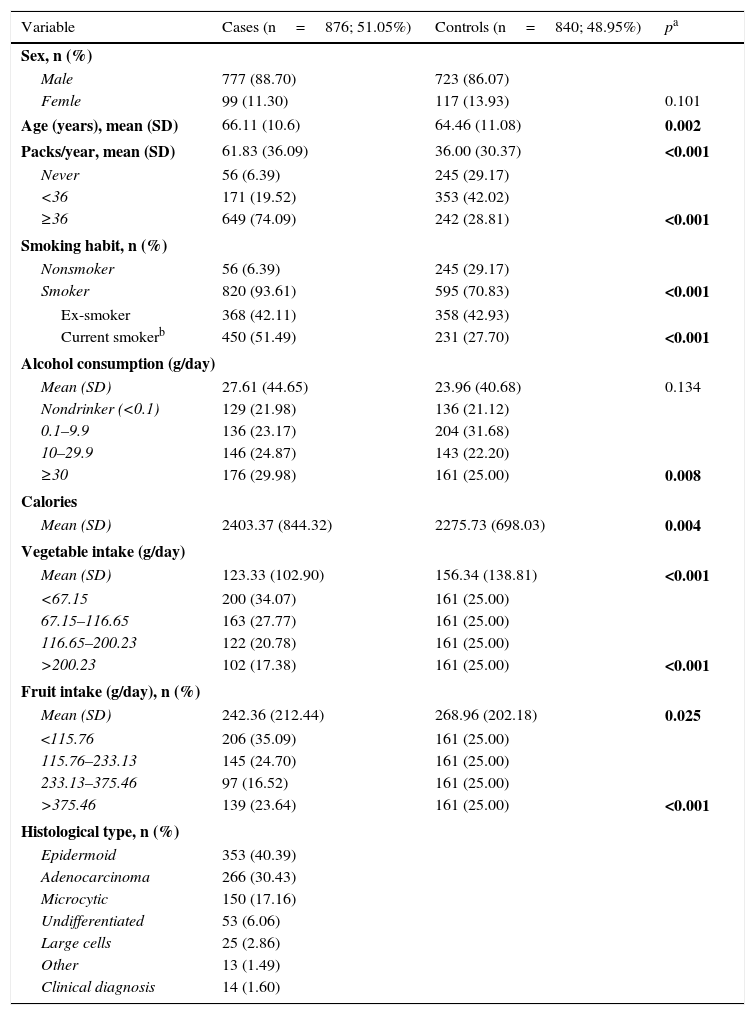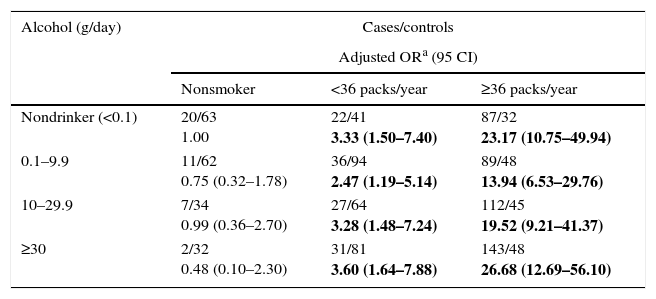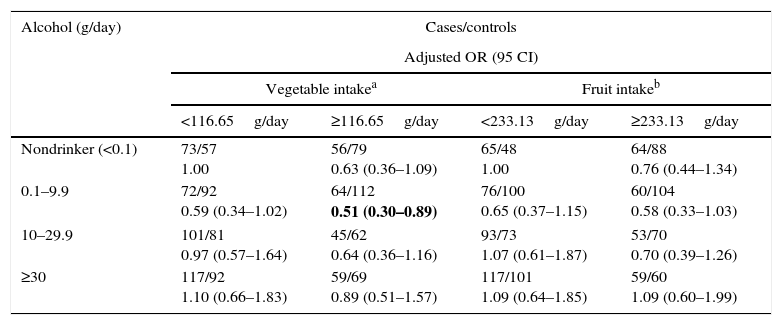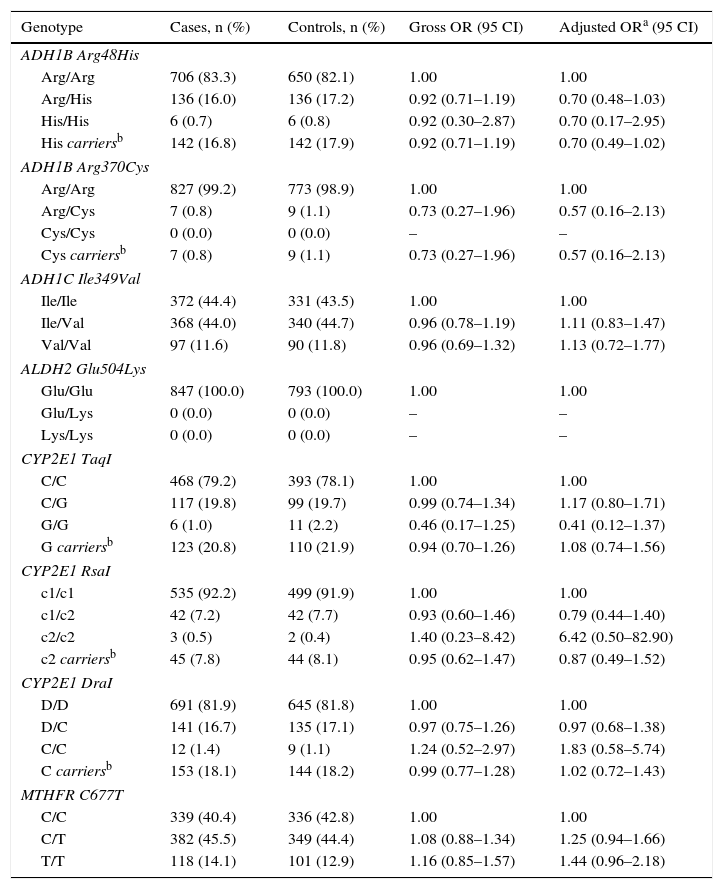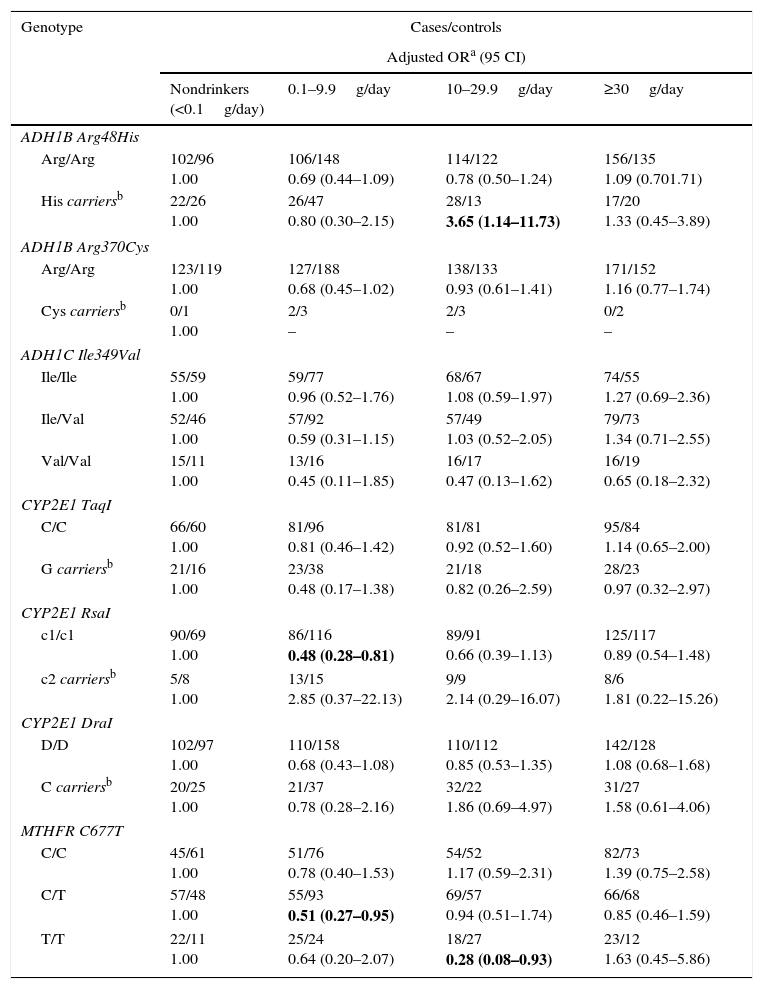Alcohol and its metabolites play an important role in carcinogenesis. This effect could be modulated by polymorphisms in genes encoding enzymes involved in the metabolism of alcohol and folate. Therefore, we analyzed the effect of alcohol consumption and ADH1B Arg48His, ADH1B Arg370Cys, ADH1C Ile349Val, ALDH2 Glu540Lys, CYP2E1 RsaI, CYP2E1 DraI, CYP2E1 TaqI and MTHFR C677T polymorphisms on the risk of developing lung cancer.
Patients and methodsWe included 876 lung cancer cases and 840 controls of the CAPUA hospital-based case–control study. Genotyping was performed using the Sequenom MassArray (iPLEX GOLD) technology.
ResultsAn alcohol consumption of 0.1–9.9g/day decreased lung cancer risk (ORadjusted=0.71; 95% CI 0.48–1.05), although statistical significance was not achieved. A consumption ≥30g/day of alcohol and ≥36PY of tobacco increases lung cancer risk (ORadjusted=26.68; 95% CI 12.69–56.10). On the other hand, a high consumption of vegetables (≥116.65g/day) and fruits (≥233.13g/day) decreases lung cancer risk with an alcohol consumption of 0.1–9.9g/day (ORadjusted=0.52; 95% CI 0.30–0.89; ORadjusted=0.58; 95% CI 0.33–1.03, respectively). An alcohol consumption of 10–29.9g/day in ADH1B 48His allele-carriers increases lung cancer risk (ORadjusted=3.32; 95% CI 1.03–10.70).
ConclusionsAlcohol and polymorphisms in genes involved in the metabolism of alcohol and folate are related to the onset of lung cancer.
El alcohol y sus metabolitos tienen un papel importante en la carcinogénesis, pudiendo estar este efecto modulado por polimorfismos en genes que codifican enzimas participantes en el metabolismo de alcohol y folato. Por ello, analizamos el efecto que podría tener el consumo de alcohol y los polimorfismos ADH1B Arg48His, ADH1B Arg370Cys, ADH1C Ile349Val, ALDH2 Glu540Lys, CYP2E1 RsaI, CYP2E1 DraI, CYP2E1 TaqI y MTHFR C677T en el riesgo de cáncer de pulmón.
Pacientes y métodoSe incluyeron 876 casos de cáncer de pulmón y 840 controles del estudio caso-control de base hospitalaria CAPUA. El genotipado de los SNP se realizó mediante la tecnología Sequenom MassArray (iPLEX GOLD).
ResultadosUn consumo de alcohol de 0,1-9,9g/día disminuye el riesgo de cáncer de pulmón (ORajustada=0,71; IC 95% 0,48-1,05), aunque no se alcanza la significación estadística. Un consumo de alcohol ≥30g/día y de tabaco ≥36paquetes/año aumenta el riesgo de cáncer de pulmón (ORajustada=26,68; IC 95% 12,69-56,10). Por otro lado, un consumo elevado de verduras (≥116,65g/día) o de frutas (≥233,13g/día) disminuye el riesgo de cáncer de pulmón con un consumo de alcohol de 0,1-9,9g/día (ORajustada=0,52; IC 95% 0,30-0,89; ORajustada=0,58; IC 95% 0,33-1,03, respectivamente). Un consumo de alcohol de 10-29,9g/día en individuos portadores del alelo ADH1B 48His aumenta el riesgo de cáncer de pulmón (ORajustada=3,32; IC 95% 1,03-10,70).
ConclusionesEl alcohol y polimorfismos en genes que participan en el metabolismo del alcohol y del folato están relacionados con el cáncer de pulmón.






